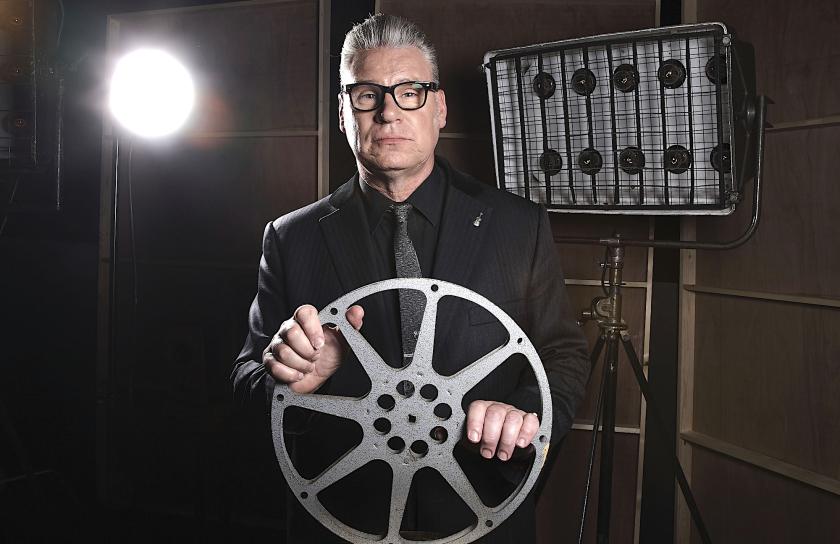Mirrors and windows, looking at ourselves or out into the world, reflecting the culture or making it: compare and contrast. This was the subliminal debate in Spies (BBC Four), the latest instalment of Mark Kermode’s essays on the history and trajectory of movie-making, with some mention too of that complementary form of film, the television programme.
Spies, espionage, conspiracy, and what you see isn’t necessarily truthful or real – does all this sound and feel familiar? All human behaviour is here, from trust and loyalty to morality, immorality and amorality, the relationships of individuals to institutions, citizens to government, mavericks to authority, good guys and villains. We are confronted with the secret agent, the assassin and spy, and the amateur and the unsuspecting caught up in the great game. Kermode’s question was why do we keep coming back for more?
 The spy novel dates from the late 19th century, with the growth of the organised security and spy agencies on the part of the nation state; in filmic form from the 1920s. The genre plays on paradox and fear and feeds on fantasies, as explored by Hitchcock in Notorious or North by Northwest. Even the theme songs are inescapable. The famous ones from the Bond films can become permanent earworms. Paranoia is a habitual ingredient, and the real world affects the fictional. In the 1960s and 1970s there was the Cold War, Vietnam, the Kennedy assassinations and Watergate – and The Manchurian Candidate with Frank Sinatra (pictured above with Laurence Harvey). The possibilities of nuclear Armageddon inspired such films as Kiss Me Deadly, to name but one.
The spy novel dates from the late 19th century, with the growth of the organised security and spy agencies on the part of the nation state; in filmic form from the 1920s. The genre plays on paradox and fear and feeds on fantasies, as explored by Hitchcock in Notorious or North by Northwest. Even the theme songs are inescapable. The famous ones from the Bond films can become permanent earworms. Paranoia is a habitual ingredient, and the real world affects the fictional. In the 1960s and 1970s there was the Cold War, Vietnam, the Kennedy assassinations and Watergate – and The Manchurian Candidate with Frank Sinatra (pictured above with Laurence Harvey). The possibilities of nuclear Armageddon inspired such films as Kiss Me Deadly, to name but one.
The thriller can embody both the fearless secret agent and the analytical officer who does not physically risk his life in the field. George Smiley is the cuckolded husband, and worn down by office politics. Sean Connery and Daniel Craig are super-spies, Gary Oldman’s Smiley the grey man who passes among us unnoticed. James Bond has to have the big screen; Le Carré’s Circus and its grey offices works on television too (pictured below, Daniel Craig as Bond).
 We delved into dreary bureaucracy with Michael Caine as Harry Palmer in the films adapted from Len Deighton’s novels, enacting too the subliminal resentment the worker has for the boss. Drab but diligent work, in contrast with superspy fantasies. Realism intruded to a degree; The Lives of Others, about East Germany’s pervasive Stasi spy network, was one of the most compelling and tragic films this century. And the more realistic, the more understanding the adversary: the doomed Mark Rylance as the Russian agent, with Tom Hanks as his empathetic American lawyer, in Bridge of Spies, set in the Cold War and based on the true story about the exchange of Russian spy for American pilot.
We delved into dreary bureaucracy with Michael Caine as Harry Palmer in the films adapted from Len Deighton’s novels, enacting too the subliminal resentment the worker has for the boss. Drab but diligent work, in contrast with superspy fantasies. Realism intruded to a degree; The Lives of Others, about East Germany’s pervasive Stasi spy network, was one of the most compelling and tragic films this century. And the more realistic, the more understanding the adversary: the doomed Mark Rylance as the Russian agent, with Tom Hanks as his empathetic American lawyer, in Bridge of Spies, set in the Cold War and based on the true story about the exchange of Russian spy for American pilot.
Spy films traditionally end with the mission accomplished, but Kermode closed on an ambiguous note: post 9/11, post Cold War, post truth and in a world of fake news, just as the movies are in colour, the stories are in shades of grey. Kermode’s fascinating essay made us all want to get back to the movies. The great game continues and the movie spy lives on.















Add comment